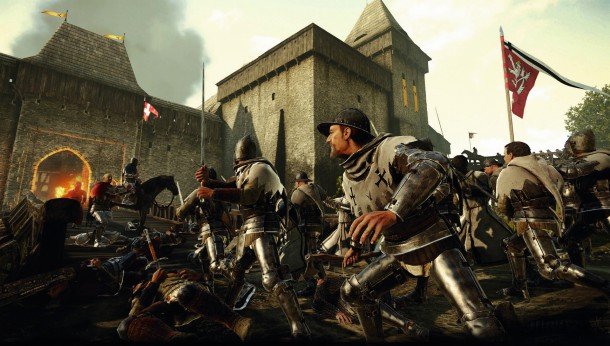
Written by Ben Griffin
Dungeons without the dragons. That's how Prague-based developers Warhorse are describing their curious Kickstarter smash hit. Set in 15th century Europe, Kingdom Come: Deliverance is a period piece rooted in realism, a ye olde RPG refreshingly void of blue magic and armoured bikinis.
You play a young blacksmith who, in fulfilling the dying wish of his father (because those are legally binding), must save a kidnapped king and prevent bloody civil war. Fate does not ordain you unite the land or obtain a powerful trinket. You're just some guy. Maybe you like crime novels too, who knows.
“Our story is rooted in real historic events,” says Daniel Vávra, Warhorse's creative director, best known for his work on the Mafia series, which is also built around the premise of being some guy who gets drawn into a larger world. “You are a regular man who gets involved in these events by accident, and you have a chance to take part in it. We try to paint the world as it is, not just black and white, and we try to make everything natural.”
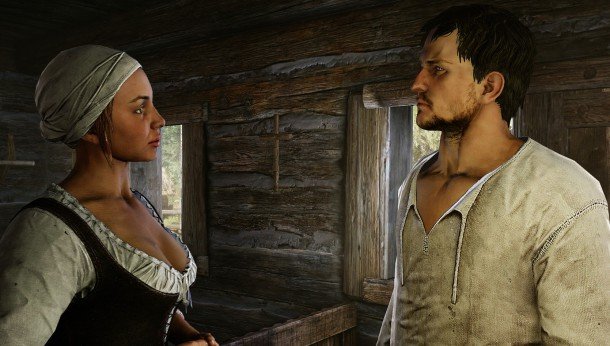
Despite your ordinariness, you have agency. Your character can become a battle-hardened knight, sneaky rogue or charming bard, and dress in up to four layers of amour or clothing. You can improve skills such as swordsmanship, archery, alchemy, strength, agility and speech simply by using them, but you'll also have to keep an eye on your stamina, health and hunger levels. Just because Gandalf never had to stop and chomp on a turkey leg doesn't mean you won't.
Your freedom extends to a nonlinear story in which you can play saviour or sinner, with NPCs reacting accordingly. “We're cooperating with Charles University Computer Science AI department on the AI and our goal is to simulate daily life, to let the player mess with NPC cycles, and to have all the issues that come with this solved,” says Vávra.
He offers an example: “so there could be a guy who goes to the pub every evening. That is part of his routine. It could happen that the pub is full one day, which is not a problem, because this guy has plan B so he will go to different pub. But what could happen is that you were here before and killed the bartender.”
Keep up to date with the most important stories and the best deals, as picked by the PC Gamer team.
Well yes, that could happen. But this is still not a problem, “because the poor guy has a plan C, so he will first call local sheriff, the sheriff will take care of the body and our NPC will then go home and drink there. The whole thing is not scripted, but rather an unpredictable emergent system with tons of different variables.”
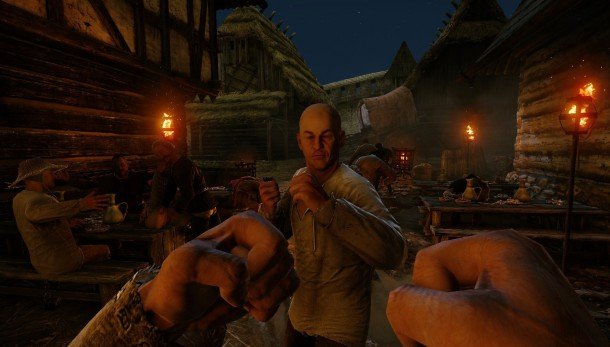
There's an economy to influence, too, but this revolves around the price of goods rather than real estate – there's no buying houses. With Warhorse a mere 30-man development studio, there's only so much manpower to go around.
And much of that manpower, it seems, is going into the combat. It's based on actual 15th century fighting techniques and mo-capped by medieval martial arts gurus, thanks to the game meeting a £700,000 stretch goal on Kickstarter. So how does melee combat work in a game that's firstperson? “You can select which body part you want to hit and choose from several different moves, which gives you lot of options... when you hit something, there is a collision and proper physical reactions. And on top of that, stamina plays a major role in the combat when you stand against armoured knights.”
Expect swords, sabres, daggers, shields, hammers, bows and crossbows, both oneon- one and in rare but spectacular largescale battles. Vanilla swords are perfect allrounders, but weak against plate armour; hammers are ideal against plate armour, on the other hand, but weak against swords.
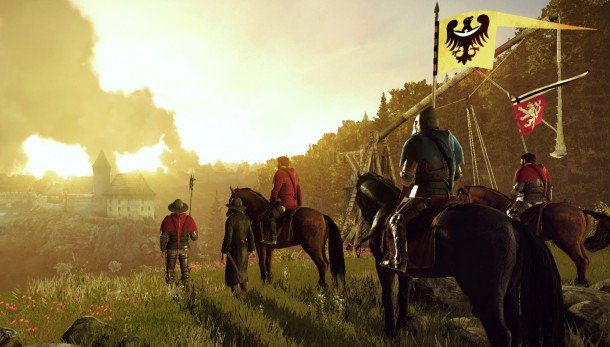
You can fight on horseback, too. Horses are capable of strafing, running backwards, and even kicking Buckaroo-style. But Deliverance is about realism, and last time I checked horse-riding and sword-fighting occupies only a relatively small portion of my typical working day. So what else is there to do?
Plenty. You can chase bandits and rob merchants, hunt animals and treasure, fish, dig for silver, and even embark on that manly favourite, herb picking. Herbs and The devs have worked on Mafia 2, Arma and Crysis 3. other ingredients are used in alchemy in which you'll bosh up status-changing potions and ointments. You can also forge and sharpen weapons, and fill your belly by distilling alcohol and cooking food. For these pursuits, Warhorse promise an absence of soulless menu screens in favour of intuitive minigames. When sharpening your blade, for instance, you'll actually put it to a stone wheel and watch the sparks fly.
You have 3.5 square miles of open land to explore in total. Sights range from splendid castles to secret passages, great cities to sleepy hamlets, mines to forests to catacombs. Courtesy of CryEngine 3, all objects have HD textures, there's a day/ night cycle with varying weather, highdetail clothing and, I'm told, unlimited viewing distance.
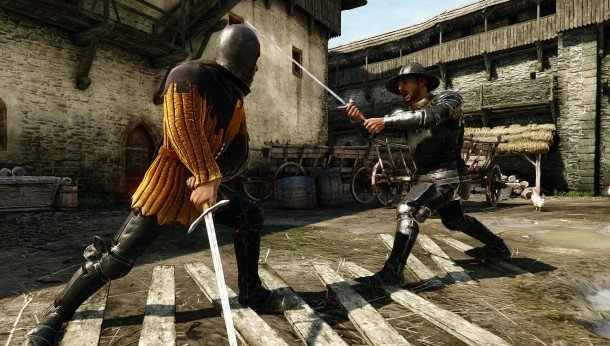
An RPG lives or dies by its quests, however. Thankfully, Deliverance's look fresh and dynamic. Warhorse talk of leading an army to besiege a bandit fort, playing a medieval investigator searching for a mass murderer, interrogating, bribing and threatening people, and even ( tugs at collar ) seducing ladies. Each quest has multiple solutions – whether by sword, smarts or swoon-worthy charm.
For Vávra, quests must engage. “Collect seven pieces of the magic sword/staff/amulet/spear and use it against mystical evil which is going to destroy the world?” That's not quite Vávra's style. “Some want NPCs to react naturally to your actions, we want the world to work naturally. And when you do that and do it right, then most clichés disappear and even small basic quests like 'bring this item from place A to place B' make sense and feel authentic.”
Take the fantasy away from swords an shields, and you have a subject matter that's clearly captured the imagination of its backers. But how far will it take its realism? Permadeath via a gammy leg after 20 hours would no doubt win a few people over.
PC Gamer is the global authority on PC games—starting in 1993 with the magazine, and then in 2010 with this website you're currently reading. We have writers across the US, Canada, UK and Australia, who you can read about here.


